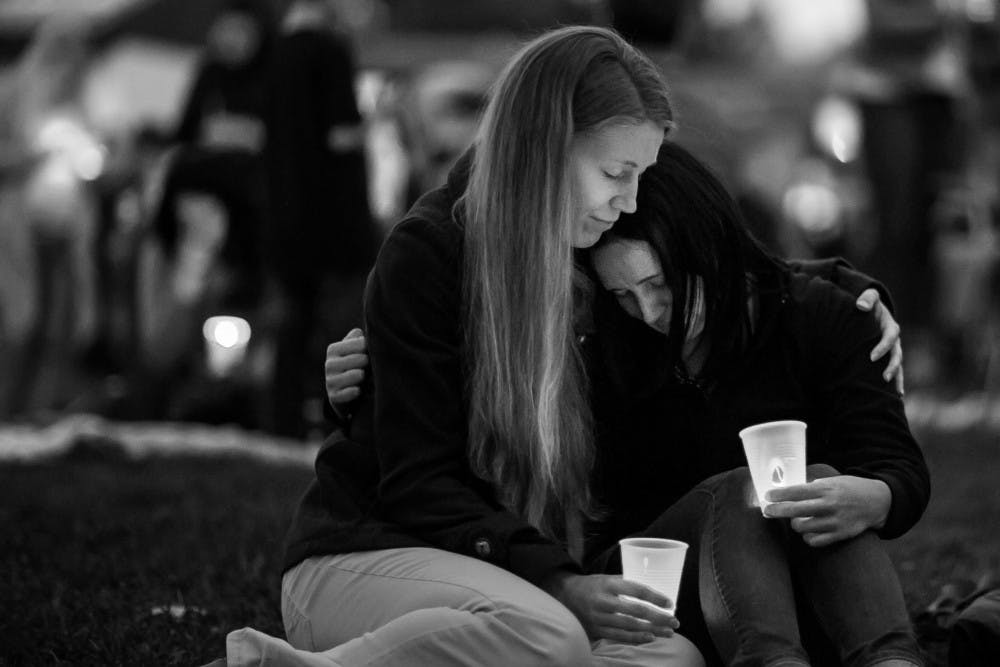I heard him speak in a soft tone: “Everything happens for a reason.”
I remember feeling uneasy, as I overheard someone trying to justify the difficult circumstances previously stated.
I couldn’t help but feel like it’s an excuse with good intentions. It’s used frequently in our society to help quench the desired need of purpose. As time passes, however, it seems that phrase has lost its validity.
For a long time, I would use that simple quote to try and relieve my friend’s minds, but as any college student knows, our problems aren’t simply black and white anymore. As many of us have experienced, we aren’t just losing high school football games, we are losing family members.
Times have become significantly more challenging as we have grown and matured. I’m sure you’re reading this and could think of several tragic occasions that have happened to you or a friend, and you want to believe that those horrible things serve a meaning.
I want to challenge our idea about this principle however. I’m not here to attack good people who use this phrase, but to build upon their desire to aid others. Perhaps there are far more meaningful principles that we can draw upon than this one. Perhaps we can use better language to give others hope.
Because, perhaps, not everything happens for a reason.
I’ve always struggled with this universal standard that each and every good or bad thing that happens is justifiable.
One might argue that I wouldn’t be who I am today without the hard circumstances I’ve experienced. I encourage people to stand up and accept themselves, and be proud of who they are — that I don’t disagree with. The logic behind this statement however is faulty. You wouldn’t know who you would be if those tragic circumstances didn’t occur. It’s hard to make that argument when there is no other evidence to test it against.
I have a dear friend of mine whose mother attempted suicide. It was a disheartening sight to see such a special person in so much pain. How does that situation serve her a purpose? Someone could argue that she has the ability to empathize with someone who is contemplating suicide, and give them reasons why they shouldn’t. That’s a logical argument, however, it wouldn’t be the only way she can accomplish that. There are tremendous amounts of resources available to help someone who is contemplating their life.
When it comes down to it, I want my friend to know that she happened for a reason, not her circumstances. I want her to know that she’s special, not the things that she has endured. We should know by now that our lives are not a movie, and that our stories are far more complicated than a simple, short phrase can say. That’s where I take a separate path for dealing with pain. I do not believe everything happens for a reason. Perhaps our pain is meaningless.
In an examination of human beings it is inspiring to be reminded of how truly incredible we are. Each of us have special talents to sing, or to draw, or to write, or to speak and that’s why we are in college. That’s why we are all here at ASU.
Because we have a purpose.
You are going to experience heartaches and agonizing tragedies. College is going to beat the crap out of you emotionally. You will find yourself laughing hysterically and in the same night crying endlessly. You’re going to have to face very real adult situations. And while these things may not hold a reason, they do not take away from the fact that you hold a purpose.
I want to stress that in our lives we have chaos. There are things in this life that we can’t control. Some of us are going to fail critical tests, some of us are going to have to bury a parent, way before we thought imaginable. Yes, those events may not have happened for a reason, but the person you are — that has meaning.
So I encourage you, my fellow students, when you hear that a friend is enduring pain, don’t tell them that it happened for a reason, tell them they happened for a reason. When your classmate is feeling alone, remind them of the individual qualities that make them who they are. Remind them of their uniqueness.
You have a purpose, you have meaning, you matter, and no matter what you have faced in life, you still have the ability to do something to change this world. We don’t change the world by changing every person on the planet, we change it by making a difference in one person’s world.
Related Links:
Coffee Conversations: Purpose, Reason And The Difference Between the Two
Discovering the hero in ordinary people
Reach the columnist at jarwood@asu.edu or follow @jimsthebeast on Twitter.
Editor’s note: The opinions presented in this column are the author’s and do not imply any endorsement from The State Press or its editors.
Want to join the conversation? Send an email to opiniondesk.statepress@gmail.com. Keep letters under 300 words and be sure to include your university affiliation. Anonymity will not be granted.
Like The State Press on Facebook and follow @statepress on Twitter.




